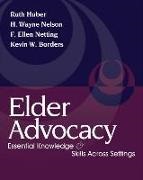Read more
List of contents
Part I: UNDERSTANDING CONTEXTS.
1. Approaching Complex Delivery Systems.
2. Theoretical Frameworks for Understanding Context and Settings.
3. Clarifying Advocacy Roles and Relationships.
Part II: GATHERING INFORMATION.
4. Assessing Elders'' Needs in Context.
5. Investigating and Analyzing Situations.
6. Planning Interventions.
Part III: PRACTICING ADVOCACY.
7. Intervening with Individuals.
8. Mobilizing Resources for Macro Interventions.
9. Evaluating Advocacy Outcomes.
About the author
F. Ellen Netting is Professor of Social Work at Virginia Commonwealth University in Richmond, Virginia. She practiced within the aging network in East Tennessee where she gained expertise in working with elders in diverse community-based settings. Drs. Huber, Nelson, and Netting are Fellows within the Gerontological Society of America (GSA).Kevin Borders is an Assistant Research Professor at the Kent School of Social Work at the University of Louisville where he directs various grant projects and continues his research on institutional abuse and aging.Ruth Huber is Professor of Social Work and Director of the Doctoral Program at the Kent School of Social Work at the University of Louisville in Louisville, Kentucky. She has expertise in the National Long Term Care Ombudsman Program, hospice, and advanced directives.H. Wayne Nelson is Associate Professor in the Department of Health Sciences at Towson University in Baltimore, Maryland. Formerly he served as Deputy Director of the Oregon State Long Term Care Ombudsman Program for 16 years where he trained and supervised numerous ombudsman volunteers.
Summary
This text will empower you to effectively solve client problems in the often highly charged, highly interactive elder-service environment.

